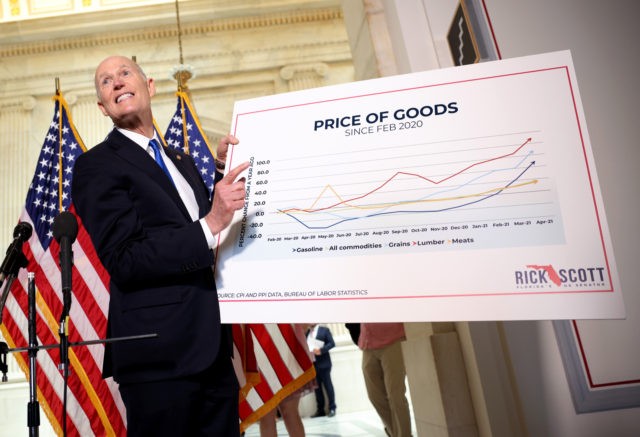U.S. consumers expect much higher prices over the next year and they expect elevated inflationary pressure to persist for years, data released Friday showed.
The University of Michigan’s survey of consumers in May indicated that consumers expect a 4.6 percent rise in prices over the next 12-months, the highest level of inflation expectations since April 2011.
The expectation for 5-year inflation hit 3 percent, also the highest level in several years.
“Record proportions of consumers reported higher prices across a wide range of discretionary purchases, including homes, vehicles, and household durables – the average change in May vastly exceeds all prior monthly changes,” said Richard Curtin, the survey’s chief economist.
Despite rising prices, consumers are unlikely to pull back on spending because their savings have been boosted by multiple rounds of stimulus payments and very large government deficits. Deficit spending tends to boost saving because the federal government spends more into the private sector than it removes in taxes.
The faster-than-expected ebbing of the pandemic, stimulus payments, and the stronger-than-expected strength of the reopening of the economy has led to a surge of spending by consumers and businesses, leading to some shortages and driving prices higher.
“It is hardly surprising that the resurgent strength of the economy produced more immediate gains in demand than supply, causing consumers to expect a surge in inflation,” Curtin said. “While higher inflation will diminish real incomes, the gains in spending will nonetheless be substantial. The key issue is whether the timing of spending decisions will advance due to the expected price increases.”
The survey’s Consumer Sentiment Index declined in May, with both the present condition and expectations components falling. The gauge of current conditions fell more rapidly, perhaps because of supply constraints and higher prices.
Officials in the Biden Administration and at the Federal Reserve have said that they expect higher inflation to be transitory. Treasury Secretary Janet Yellen, however, recently said that the higher inflation would likely not subside until next year—a longer timeline than Yellen and other officials appeared to indicate in prior statements.
Curtin, who is set to retire as chief economist of the survey later this year after decades helming the most influential consumer poll in the U.S., says there is a risk that the Fed’s new attention to racial inequalities in unemployment could result in inflation running hotter for longer. But higher inflation would hurt the very groups the Feds is hoping to boost.
“Early preventative actions are much less costly, but these actions are much more difficult when policy objectives include avoiding uneven distributional impacts across population subgroups. It will require keeping the level of stimulus higher for a longer period than would have seemed prudent in the past,” Curtin said. “The primary risk of this strategy is an accelerating inflation rate, which also has uneven distributional impacts.”
Cutin indicated that the Fed could tamp down on inflation without immediately hiking rates by adjusting the language it uses to discuss the path of monetary policy.
“Shifting policy language and a small rate increase could douse inflationary psychology; it would be no surprise to consumers, as two-thirds already expect higher interest rates in the year ahead,” Curtin said.

COMMENTS
Please let us know if you're having issues with commenting.